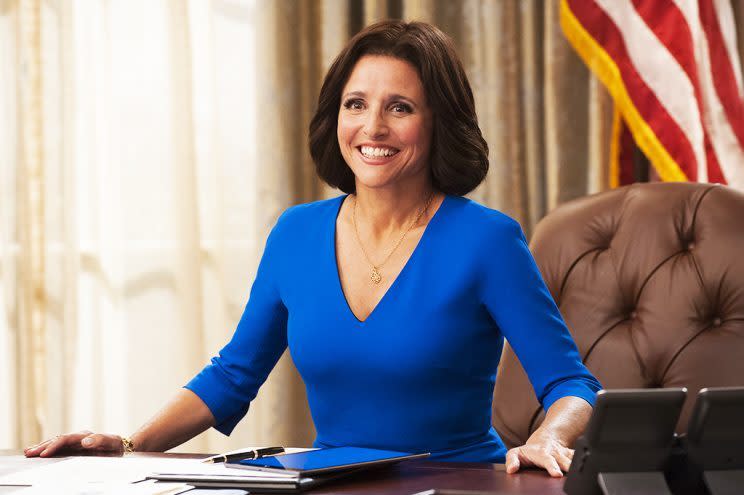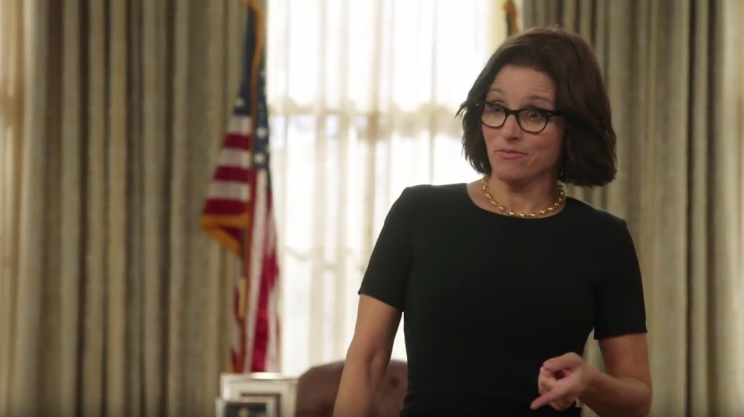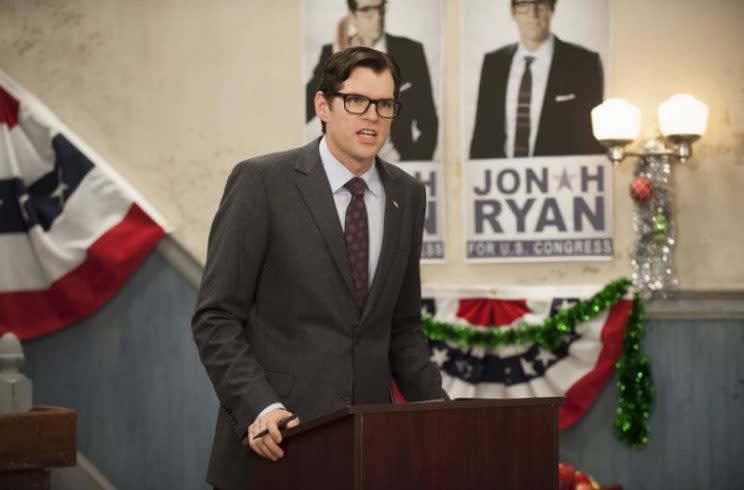Emmy Talk: 'Veep' Showrunner David Mandel on Season 5's Defining Moments

As Emmy season continues — final voting runs through Aug. 29 — Yahoo TV will be spotlighting performances, writing, and other contributions that we feel deserve recognition.
The fifth season of HBO’s Veep, the first with executive producer David Mandel at the helm, scored 16 Emmy nominations, including Outstanding Comedy Series, five nods for acting, three for directing, and two for writing. Mandel spoke with Yahoo TV about the standout episodes and memorable moments from the season, which is now available on Digital HD.
Yahoo TV: You’re nominated for writing the Season 5 premiere, “Morning After.” Was there a moment that, once you landed on it, you felt like, “We got this, this is going to be a great season”?
David Mandel: There was definitely an earlier draft that didn’t quite feel right, as I was definitely trying to find not only what Veep is but also what my Veep was going to be. There were a lot of different versions of how it was going to start. I was playing with starting with them coming home from the election that night. There was a version where [Julia Louis-Dreyfus’s Selina] woke up in bed that morning, with Gary waking her up and her looking at the television. Ultimately, we came upon this idea of starting with her addressing the American people — not a bedroom scene, not a private scene. Really just jumping right into her addressing the nation, thanking the American people for this horrific tie that they put her in. That first five or 10 minutes of her giving the pro-democracy speech and then walking through the halls to the big meeting and picking up the different staff members along the way — launching Catherine’s story about her film, and moving on and bumping into Mike, and Mike launching his story about trying to adopt a baby. As we made this journey to the Roosevelt Room, all of a sudden, it felt like this is where the whole season is getting set up in a really great way. I felt like, “Okay, we’re on our way.”
That’s also the episode in which we learn that Richard Splett (Sam Richardson) actually has doctorates that, at least theoretically, make him useful in the recount process. What was the inspiration for giving him a real purpose?
Obviously Sam is brilliant, and in a show filled with a lot of horrible people who are certainly working from somewhat impure motives, I do think one of the things that is most interesting about Richard Splett is that he actually still believes. He’s a genuinely good guy who believes in the power of government to do good. I think that’s sort of refreshing in our world of cynics. That was something I responded to, and as a writer, I guess I’m always interested in new relationships or upending relationships. He had so much been the junior man to Jonah, it seemed very funny that if we could upend that and now Jonah would be working for Richard, that would be a really interesting thing — not only to see what it did for Richard, but also to see what it did to Jonah, who obviously like the petulant child he is kicked at the sand and stomped around a whole bunch. It just seemed like right from the get-go, it was going to provide a lot of new comic possibilities.
You’re also nominated for directing “Kissing Your Sister,” the episode that was Catherine’s documentary. I love the little things that we learned in this episode, like that they genuinely wanted to fire Mike (Matt Walsh).
When we launched the notion of her doing the film back in episode 1, we kind of new the idea was that we would do this film as episode 9. That was the plan. When we did finally get to it, there was the opportunity to fit back in these lost moments, these scenes that were either before or after scenes we saw [in previous episodes], and really almost add in plots to the whole season that you didn’t even know were going on, which is an almost delicious opportunity. It was just really fun to play with the expectations, and the Mike thing… The notion that he’s going to soon be out of work, especially as his parenting bills are getting higher and higher and higher, it just felt very Mike.
Related: ‘Veep’ Star Sarah Sutherland Talks Catherine’s Documentary
How did you decide that the baby he and his wife would eventually adopt would end up being a six-year-old?
I will say my wife is a pediatrician, and she doesn’t necessarily specialize in foreign adoptions, but she’s had a couple of them in her history as a pediatrician. A lot of times, with these foreign adoptions, the medical paperwork is just a mess, so it’s an exaggerated version of a real issue. It just seemed, again, in that perfect world of “only Mike,” that he’d set out to adopt a baby and end up not only obviously with two twins via a surrogate, but also not get a baby and instead end up with a 6-year-old girl who is just not what they were expecting. Especially after you’ve seen him putting together a baby room, no, this girl needs a bed. This girl needs a booster seat, not a car seat. That just seemed exactly right for Mike.
That episode has the moment with Selina, after she’s lost the presidency for good, running into a tour group in the White House. They applaud her, and she keeps saying, “Thank you, thank you.” I was tearing up watching that, which caught me by surprise.
It was a scene that was much discussed on our end. You’re never 100% sure how these things are going to go. Number 1, we got really lucky with the wonderful woman who plays the woman on the tour line who was just so real and gave Julia someone to play off of. To me, it was Julia’s A Star is Born, “Mrs. Norman Maine,” Judy Garland moment, if you will. We were half tearing up at the monitor, just watching her again absorb those cheers and, in some way, almost feeling like these are the last cheers she’s ever going to hear. She’s not going to be President of the United States. It was wonderful and heartbreaking. I love directing that entire episode, but it’s my favorite scene that I got to do, just because for one little moment I felt like a real director.
“Mother” is an episode that has nominations for director Dale Stern and writers Alex Gregory and Peter Huyck. What was it like to watch Julia deliver that eulogy at her mother’s funeral, right after Selina finds out she’s lost the Nevada recount and therefore the popular vote?
It was just stunning. She continues to surprise me. Let me start with the beginning. One of the things I definitely wanted to bring to the show this season was a chance to, ever so slightly, knock around on the inside of the heads of some of the characters. It’s not necessarily a new direction, but it just adds a little depth to who these people are: Why are they like this? What makes them tick?
The death of her mother and the analysis of her relationship with her mother, and the effect of that — how it affects her relationship with Catherine and history repeating itself — was just sort of a fun way in. The death itself, I just knew it was going to provide Julia with these opportunities to have these mixed up emotions coming out all sideways, because it can’t come out the normal way it comes out in a normal human. Selina’s not a normal human. It’s emotion that wants to come out as sadness, but it can’t, so it just kind of comes out in strange and different ways.
By the time we got to the eulogy and this notion that at the same time her mother’s death is hitting her along with the loss in Nevada, and which of these two things is she crying about, one or the other or both, plus the Tim McGraw song playing in the background… just watching Julia, she’s one of the few actors who can process six things at once. It was just honestly stunning.
We did one full take through, and it was like, “Well, I know we have this, and I know people have never seen anything like this. But let’s do another. See what happens next.” I think in the second take, she started rocking to the music a little bit. With her, she’s always inventing, always pushing things forward in a wonderful way.

There’s a moment from the season finale, “Inauguration,” that has great layers as well. It’s the meltdown Gary (Tony Hale) has on the staff when he tells them that he is the only one who at least cared. We see everyone filming him, they’re laughing inwardly at him, and yet as a viewer, that line really hits you and rings true. You feel his anger toward them.
It was a really interesting scene because for him, in a way, he loves her so much and he just can’t imagine that this has happened. He does blame them for it, and he wants to yell at them, and at the same time, I think he’s aware that she can’t yell at them. In that moment, she has left the room and he wants to yell at them for her also and say what he thinks she would say to them.
Everything he says is really, if you think about it, 100% true, yet because it is coming from him, they laugh and ignore it, which just makes it all the more horrible and funny to watch. We get so used to Tony, and I mean this in the best of ways, hovering as Gary in these scenes and throwing in these small little moments and reactions and whatnot. The opportunity to watch the pent-up Gary rage come out of him, full force, was just another of the great pleasures of getting to do my job.

What was the inspiration for the “C**tgate” episode, which earned a nomination for production design?
The main inspiration is hopefully our production designer gets an Emmy nomination for “C**tgate,” and he wins, and somebody has to say, “Veep, ‘C**tgate'” on a stage somewhere. That’s the main inspiration.
It’s a little bit of the elephant in the room, which is from the beginning of the season, we got a huge number of, “Is Selina Hillary? Is she Hillary? Are you doing Hillary?” We’re not doing Hillary, but we are doing a female President of the United States — a female president who has to deal with being a female. It was about as the pressures are getting to her, and she’s kind of, as they say, “going Full Metal Nixon,” the tensions are increasing. But it is a horrifying word to a lot of people. Then we were able to have fun with the media side of it, and really play it for all it’s worth.
I think ultimately, it really does come down to the scene between Selina and Amy where they talk about, “Have you ever been called a c–t?” And Amy says, “Yes, many times.” Selina’s take on it is, “Well, so have I, apparently. Once.” Obviously she’s been called it more than that, but doesn’t know it. In those different scenes, in the nighttime scene where she talks about the fact that she feels fundamentally America hates women — again, it was not specifically about Hillary, but I do think we have seen over these last eight years, unfortunately, that we are a country that is more racist than we like to believe, and I think we’re a country that is more misogynistic than we like to believe. I think the chance to comment on those things is, for us, a really great opportunity.

We should also touch on the great year had by Jonah (Tim Simons). Was there a moment of his campaign for Congress that you were particularly proud of?
For us, where it came from was a solution to a writing issue, which is we have this very complicated story of Selina in a tie, which was ultimately going to go to the House of Representatives and they were going to vote on her presidency. Even though we said it 57 times during the season and explained it, it’s still a very hard concept for, I think, anybody to conceive of. We made jokes. Even Mike, I think, in the final episode, is sort of saying, “Can you explain it to me one more time?” The Constitution has a very specific procedure for this but it’s very complicated. Beyond the concept of Jonah always constantly failing upward, it was really a chance to personalize the storyline, which is basically by putting one of our characters into that vote. It was a way of helping the audience understand what had to happen.
Then, of course, it opens up the possibilities. How can Jonah screw up the vote? How can we use this to our advantage? In a way, I think it was also sort of commenting on a lot of modern candidates, one in particular who shall remain nameless, where we’re seeing we have this aspiration of the great, Founding Fathers and fine men will run for office, and yet, here we have a thin-skinned, easily-agitated nutball running for Congress and being successful. In a way, it worked out quite well for us.
Related: ‘Veep’ Star Tim Simons Talks Jonah’s Campaign Highlights
Can give us a tease about Season 6? What happens next now that Selina won’t be president or veep?
I do think, especially with Hillary running and we’ve seen so much of Bill Clinton, that the post-presidency is as much an important phase as the presidency these days — what Ronald Reagan did, what Jimmy Carter did, what Bill Clinton did, what Obama’s going to do. Next year, as our new season airs, Obama will be leaving the White House and entering into his post-presidency. I do actually think when people can get past their sadness that she’s leaving the White House, it’s the next logical step.
Veep: The Complete Fifth Season is now available on Digital HD.

